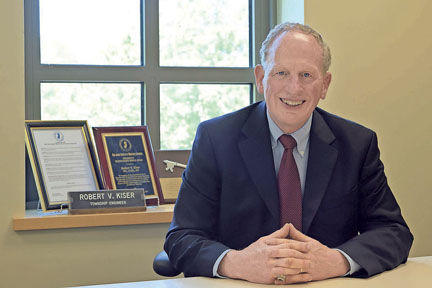By Philip Sean Curran, Staff Writer
If he adhered to his regular schedule, Princeton municipal engineer Bob Kiser spent part of the second to last week of his career in a gym making his 65-year-old legs do one more repetition of pressing 340 pounds — all before coming to work to tackle whatever problems await him.
“And it is a terrific way to start the day,” he said, seated in his Witherspoon Hall office as he winds down his 42 years working in municipal engineering, part of the time in Easton, Pennsylvania and most of it Princeton.
In an interview before his final day as town engineer July 1, Mr. Kiser was reflective of his tenure here, a job that opened up at the right time in his life in 1983 when a family commitment made it necessary to be closer to home. In that span, Mr. Kiser left his fingerprints on Princeton and saw it evolve, even as he sought to be faithful to the mandate his bosses gave him 33 years ago.
“I had been told, early on, my biggest challenge would be to maintain the character of the town,” he said. “What that meant was to keep developers in check as the town grew. It meant constructing roads that were two-lane roads as opposed to four-lane roads.”
He feels he has succeeded in keeping that charge. That has meant dealing with developers, improving parks and roads, facing challenges and dealing with the people and personalities that make up Princeton.
“I’ve always enjoyed it,” he said. “I think what’s really kept me here so long is the excitement and the challenge of improving the quality of life for Princeton residents in many different ways.”
Facing those challenges, and solving them, appealed to an innate interest that was nurtured as a boy growing up in rural New Jersey.
Mr. Kiser, originally from Bridgewater, is the youngest of three sons born to parents who brought up their children on a 15-acre-farm in that Somerset County town.
“We were like weekend farmers,” he remembered of how the 3,000 chickens on the farm needed his attention.
“So when I got home from school, one of my jobs was feeding the chickens. And then we had to grade all the eggs by hand once a week,” he said. “So that was part of growing up.”
Civil engineering ran in the family, so Mr. Kiser seemed destined to follow in the path of his maternal grandfather and then, father, Vernon, both of whom were Ivy League-educated engineers.
“I guess what really interested me is the problem-solving aspects,” he said, crediting the farm experience of repairing and fixing things with leading him toward the field he would make his career.
Mr. Kiser studied engineering at Lafayette College and, after graduating in 1974, he applied for a job with the city of Easton, Pennsylvania. The head of the civil engineering department at Lafayette, Vincent Viscomi, had told him about the opening and suggested he go for it.
He was hired as a junior engineer and began his career — the only one he ever would know professionally — in June of 1974. Three and a half years later, he was at the top of the department with 100 people working for him.
“Being a municipal engineer is like being a general practitioner in the medical field, where you need to know about a lot of different things, but you also need to know when to reach out and bring in experts to assist you,” he said. “You learn by experience.”
But when his father died in 1982, his mother found herself alone on the farm. Stepping up, he decided to leave Easton, was hired in Princeton and moved to the family farm.
“I felt very comfortable coming here to Princeton because the elected officials have been great, they’ve been very supportive,” he said. “And I knew that Princeton had the resources and also the desire to support their key officials to see that they’re successful.”
When he arrived, the then-Princeton Township was growing; developments helped to change the community. In the past 33 years, he said one of the biggest changes is the increase in traffic. To put it in perspective, when he started with the township there were five traffic signals in the entire town.
“Princeton, at one point, was a sleepy little town,” he said. “But with the buildup and the development of the surrounding areas, there’s a lot more cut-through traffic.”
As the years passed, he faced a new challenge: consolidation of the two Princetons into one community. He said he wanted to make sure the engineering department “successfully” got through the merger and that the “leadership was in place to continue on.”
So earlier this year, he announced he would be retiring, a move that his wife, Pam, a pre-school teacher who also retired this year, nudged him toward. “My wife (said), ‘You going to wait to die before you retire, is that when you’re going to leave Princeton?’ ”
One of his key assistants, Deanna Stockton, was named to replace him. He is confident things will run as they have in the department.
“We’ve got great people here leading the community. So I really feel good about that, that things will continue on. It isn’t like, ‘Well, Kiser’s leaving, what do we do now?’ ”
But what of him, now that the late-night and weekend phone calls will go to someone else? He plans to stay involved his professional engineering society and work on a 100-acre-farm he owns in Hunterdon County.
“I’ll miss the people, I’ll miss the people,” he said of moving on. “I feel good about the team that’s here in place that will carry on, so I think I’ll have a sense of satisfaction looking at what the engineering department has been able to accomplish and the staff that we have in place.”

